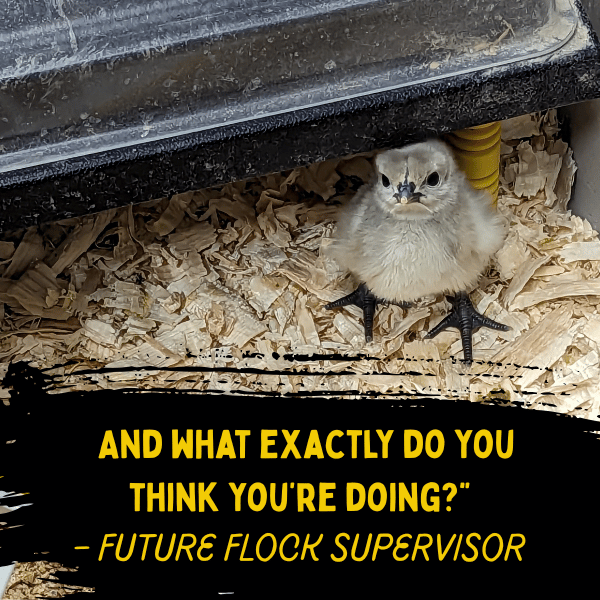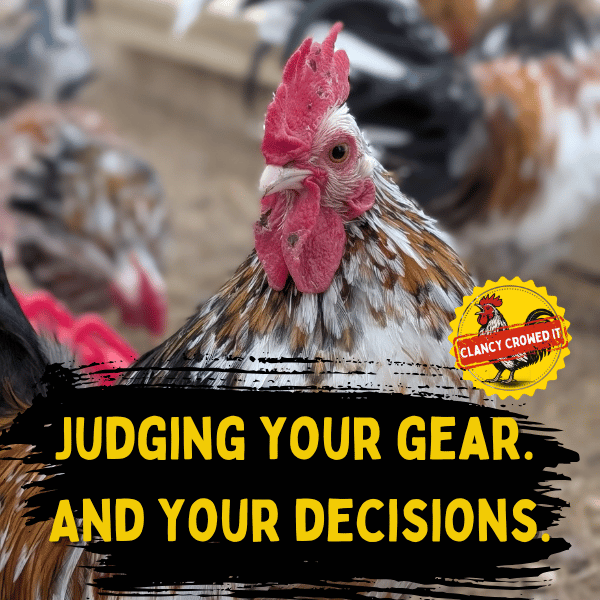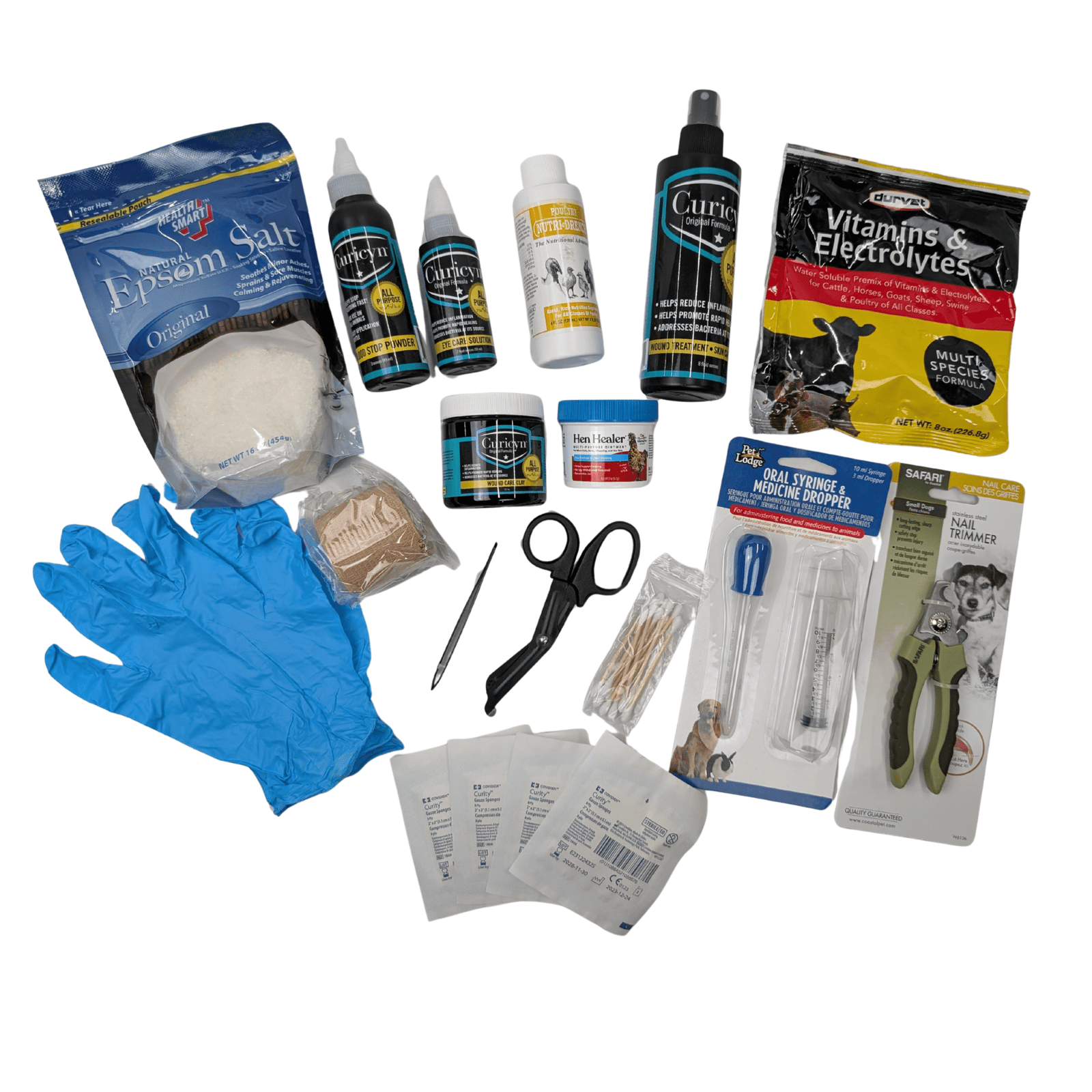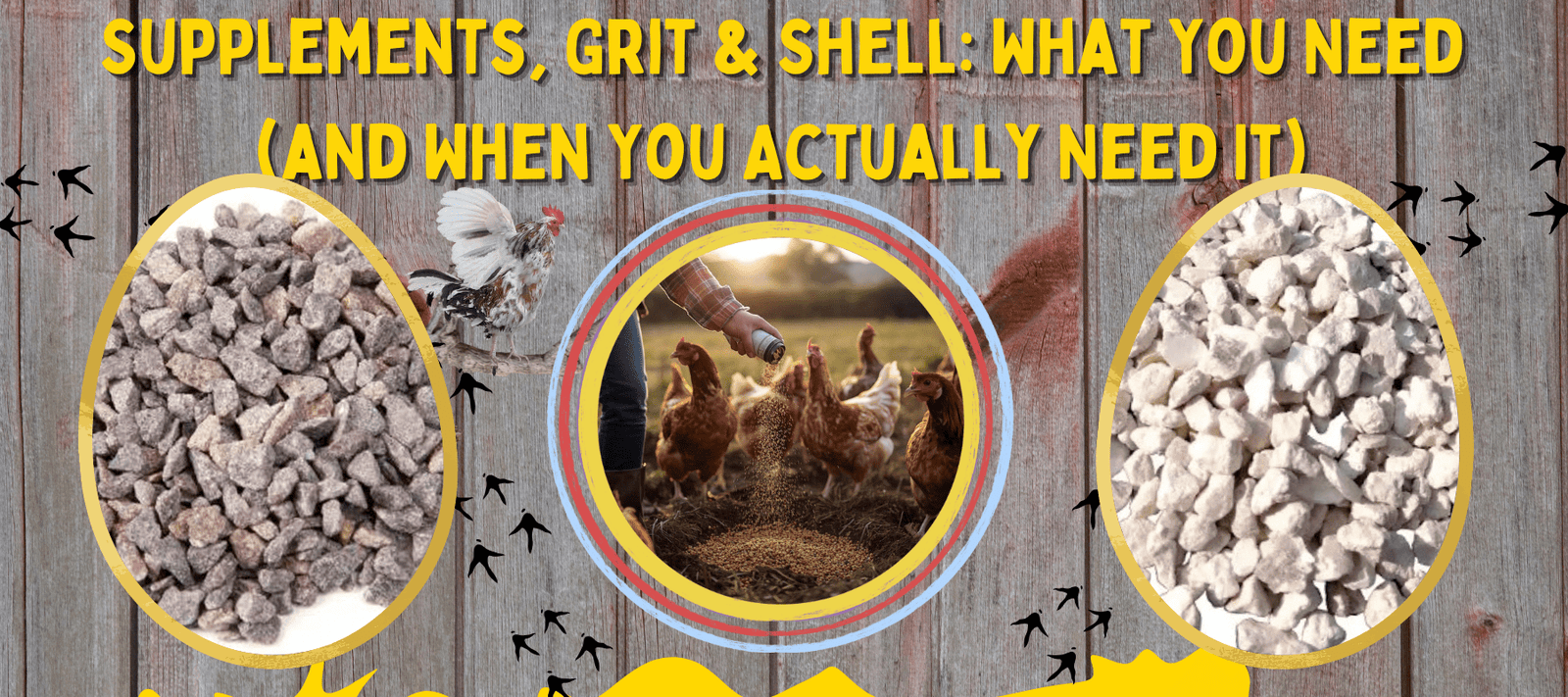Hello all you amazing chicken enthusiasts and welcome back to our blog, Just Cluckin Around! Winter is just around the corner and we know how much you adore your little cluckers. While Millie, our Swedish Flower Hen, is fluffed up and ready for winter, we want to make sure you and your flock are well-prepared too!
The dropping temperatures, icy winds, and frosty conditions can make it a little challenging for our backyard fowls. That's why a Chicken First Aid Kit, designed specifically for winter, is essential. Let's dive into the must-haves to keep your chickens healthy and warm this winter season!
The Basics:
-
Warm Water Supply: Dehydration is a big no-no for chickens, especially in winter when water can freeze quickly. Consider heated waterers or water heater bases that are specifically designed to prevent water from turning into a chicken popsicle. Ensure the wiring is safe and the waterer is placed where your chickens can easily access it.
-
Bedding: Straw is out—too inviting for parasites. Pine shavings are your go-to, offering excellent insulation and a less inviting environment for unwanted guests.
First Aid Essentials:
-
Antiseptic Wipes/Spray: Rapid and effective wound cleaning is crucial in the winter to stave off infections.
-
Vet Wrap and Gauze: Indispensable for treating injuries without tugging at feathers. Easy to apply and remove.
-
Humidity Control: Forget Vaseline for frostbite—proper humidity control is where it's at. Make sure your coop is well-ventilated yet devoid of drafts to keep those combs and wattles safe.
-
Unscented Epsom Salts: Great for soaking a chicken’s sore or frostbitten feet. Always make sure to use unscented, and rinse well.
-
Electrolyte Packets: Boost immunity and hydration by adding these to your chickens' water supply.
-
Vitamins & Supplements: To bridge any nutritional gaps during the nutrient-scarce winter months.
- Heat Lamp or Heating Pad: Use these only when absolutely necessary, such as in sub-zero conditions or for breeds not used to the cold. Fire hazard alert! Ensure you follow safety guidelines.
Advanced Supplies:
-
Syringes: Essential for administering medications or supplements in liquid form. They offer precise dosage control and are easier to handle during stressful moments.
-
Tweezers and Scissors: Tweezers are great for pulling out splinters or foreign objects lodged in your chicken's skin. Scissors come in handy for cutting gauze, vet wrap, or even matted feathers. Always opt for a blunt-ended pair to minimize injury risks.
-
Thermometer: A digital thermometer helps you keep track of the coop's temperature. Being aware of the temperature can be a game-changer when it comes to adjusting bedding, ventilation, and heating measures.
-
Saline Solution: An essential item for rinsing eyes or wounds. It's a gentle but effective way to cleanse without causing additional irritation.
-
Hand Sanitizer: Keeping your hands clean during any medical procedure is crucial to prevent further contamination or infection.
-
Magnifying Glass: Helpful for getting a close look at smaller injuries, mites, or other tiny but significant issues that may be affecting your chickens.
The Extras:
-
Disposable Gloves: Wearing gloves is not just about keeping your hands clean—it's also about maintaining a hygienic environment when treating wounds or administering medications. Choose nitrile or latex gloves for the best sensitivity and protection.
-
First-Aid Manual for Chickens: Knowledge is power! Having a specialized first-aid manual designed for poultry can guide you through emergencies when you can't reach an avian vet. This resource could be a lifesaver—literally.
-
Emergency Contact List: In this digital age, it's easy to rely on our smartphones. But what if the battery is dead or there’s no signal? A hard copy list of avian vets or poultry experts in your area can be a real lifesaver in emergencies.
-
Ziplock Bags and Permanent Marker: These come in handy for storing leftover medication, separated feed, or samples that you might need to bring to the vet for examination. Label everything clearly with a permanent marker.
-
Flashlight with Extra Batteries: Power outages are common in winter. A flashlight will help you navigate the coop and check on your chickens in the dark.
-
Cotton Swabs: These are perfect for applying antiseptics or ointments to small wounds. They allow for precision, ensuring that you treat only the affected area.
-
Towel and Blanket: Useful for wrapping a chicken during treatments or inspections. Make sure they’re soft to minimize stress on the bird.
-
A Small Notebook and Pen: To jot down symptoms, treatments, or observations. Keeping records can help track the effectiveness of treatments and can be useful information for the vet.
-
Snacks: Nutritious treats like mealworms or seeds can distract and calm your chickens during stressful situations. Remember, treats should make up only a small portion of their diet.
Your Cluck-Checklist:
To keep your flock winter-ready, your checklist should include:
The Basics
- [ ] Warm Water Supply
- [ ] Pine Shavings
First Aid Essentials
- [ ] Antiseptic Wipes/Spray
- [ ] Vet Wrap and Gauze
- [ ] Humidity Control Measures
- [ ] Unscented Epsom Salts
- [ ] Electrolyte Packets
- [ ] Vitamins & Supplements
- [ ] Heat Lamp or Heating Pad (Extreme Cases Only)
Advanced Supplies
- [ ] Syringes
- [ ] Tweezers and Scissors
- [ ] Thermometer
- [ ] Saline Solution
- [ ] Hand Sanitizer
- [ ] Magnifying Glass
- [ ] Scale
The Extras
- [ ] Disposable Gloves
- [ ] First-Aid Manual for Chickens
- [ ] Emergency Contact List
- [ ] Ziplock Bags and Permanent Marker
- [ ] Flashlight with Extra Batteries
- [ ] Cotton Swabs
- [ ] Towel and Blanket
- [ ] A Small Notebook and Pen
- [ ] Nutritious Snacks for Distraction
As the cold winds start to howl, let's ensure our flocks are as snug as a bug in a rug! By keeping this winter-specific first aid kit, you’re doing more than just surviving winter—you're mastering it.
We hope this guide helps you get ready for the chilly months ahead. Millie sends her clucks and best wishes for a cozy and safe winter season!












